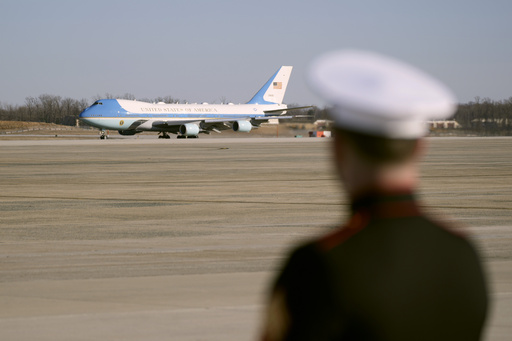The Trump administration recently denied a credentialed Associated Press (AP) reporter and photographer access to Air Force One for a weekend trip with the president. This decision was attributed to the AP’s refusal to adopt the administration’s preferred term, “Gulf of America,” when referring to the body of water traditionally known as the Gulf of Mexico. This incident marks a notable escalation in tensions between the White House and the AP, which has faced increasing limitations on its coverage over recent days.
Throughout the week, the AP experienced several restrictions from attending significant events, including a news conference featuring India’s Prime Minister and various Oval Office meetings. This restriction stems from the agency’s stance on naming the Gulf of Mexico, which the Trump administration seeks to redefine. Historically, AP journalists have travelled alongside the president as part of a press pool, serving a global audience across numerous media outlets.
The journalism community has condemned the administration’s actions, viewing them as a breach of the First Amendment rights. Many journalists argue that the government should not dictate the language used by news organizations, especially under threat of restricted access. The Trump administration, on the other hand, claimed that the AP has no inherent entitlement to cover specific events, especially in limited-space venues.
The AP refutes this claim, insisting that the restrictions imposed violate fundamental democratic principles. A spokesperson for the organization emphasized that freedom of speech is crucial to American democracy and that any actions limiting coverage undermine this essential right. The AP’s longstanding practice has been to refer to the body of water in question as the Gulf of Mexico, while also acknowledging Trump’s directive to use Gulf of America.
Meanwhile, the AP has indicated it would adjust its reporting style to reflect both names, accommodating its wide range of global clients. This flexibility is illustrated by their recent change in terminology regarding Denali, which they opted to call Mount McKinley following a request from the Trump administration.
In a statement on social media, Taylor Budowich, the White House deputy chief of staff, criticized the AP for not adhering to what he termed the legal name change. He accused the agency of promoting misinformation and contended that while the First Amendment protects their reporting, it does not guarantee unrestricted access to presidential events.
As the situation developed on Friday, the AP reporter and photographer arrived at Joint Base Andrews only to be denied entry onto Air Force One after passing security. They were informed that the decision was specific to the outlet. In a twist of irony, other journalists onboard sent images highlighting the empty seats that had been reserved for the AP personnel.
Other media organizations, including The New York Times and Washington Post, expressed their support for the AP’s right to report while largely continuing to use Gulf of Mexico in their coverage. Conversely, Fox News announced they would transition to Gulf of America, aligning themselves with the administration’s stance.
The White House Correspondents Association vocalized its disapproval regarding the treatment of the AP. While discussions among news organizations are reportedly taking place, many outlets have opted for a more restrained approach to public commentary. The New York Times reaffirmed its support for the AP, emphasizing the necessity of unrestricted access for all journalistic entities.
Globally, the incident has sparked reactions, including a statement from Friedrich Merz, a prominent German opposition leader, asserting that they would never dismiss a news agency from their press facilities. The ongoing scrutiny of the situation underscores the importance of press freedoms, particularly in the face of government pressure.
On a related note, White House Press Secretary Karoline Leavitt, who previously characterized some of the AP’s material as misleading, shared updates on social media about President Trump’s executive orders but made a point to note the exclusion of the AP from this communication.
